The Tyranny of Turf: Los Angeles Landscapes after the Aqueduct
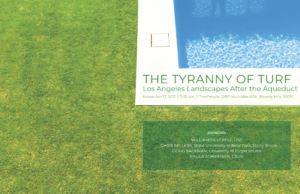
November 17, 2013
TreePeople, Los Angeles
It’s lining up to be another dry winter, with water reserves at worryingly low levels. So what’s with L.A.’s obsession with expansive green lawns? How did this landscape ideal, imported from rainy Northern Europe, come to mean the good life in water-scarce Los Angeles? Can we keep it up, or is there a better way? Is the better way possibly even more beautiful?
The conversation will be an illuminating discussion on the impact that turf lawns have had on Los Angeles area water use and what thinking outside the lawn could mean for our landscapes.
This programming is brought to you in partnership with TreePeople.
-
William F. Deverell received his undergraduate degree from Stanford University in American Studies with honors and distinction. He received his Ph.D. in American History from Princeton University. He is Professor of History at the University of Southern California and Director of the Huntington-USC Institute on California and the West, which was founded in 2004. He also directs the USC Libraries Collections Convergence Initiative. He previously taught at the California Institute of Technology and the University of California, San Diego.
Professor Deverell teaches and writes about the nineteenth and twentieth century American West. He is the author, editor, or co-editor of numerous books exploring a variety of topics and themes. They include The Blackwell Companion to Los Angeles (co-edited with Greg Hise); The Blackwell Companion to California History (co-edited with David Igler); and The Blackwell Companion to the History of the American West. He is the author of Whitewashed Adobe: The Rise of Los Angeles and the Remaking of Its Mexican Past and of Railroad Crossing: Californians and the Railroad, 1850-1910, as well as the recently-published Kathy Fiscus: A Tragedy that Transfixed the Nation. With the historian Tom Sitton, he is the co-editor of Metropolis in the Making: Los Angeles in the 1920s and California Progressivism Revisited. With Greg Hise, he co-authored Eden by Design: The 1930 Olmsted-Bartholomew Plan for the Los Angeles Region and co-edited Land of Sunshine: An Environmental History of Metropolitan Los Angeles. He and Professor Anne Hyde of the University of Oklahoma co-authored the two volume Shaped by the West: A History of North America.
-
Christopher Sellers is a historian with a long-standing interest in the environmental, cultural, and health history of the 20th-century United States, and the ways this history has compared with that of other parts of the world. His research concentrates on the history of occupational and environmental health, of cities and suburbs, of industrial development and its hazards, and of the environmental movement. Chris is co-editor of Dangerous Trade: Histories of Industrial Hazard across a Globalizing World and is author of Crabgrass Crucible: Suburban Nature and the Rise of Environmentalism in 20th-Century America, as well as a forthcoming history of the lead and petrochemical industries in Texas and Mexico. He is also a trained physician.
-
’s teaching and research areas include the history of the North American West (including California, the Pacific Northwest, the borderlands, and Hawaii and the Pacific), environmental history, and Native American history. He is the author of the books Orange Empire: California and the Fruits of Eden and Wild Men: Ishi and Kroeber in the Wilderness of Modern America, and he is editor of A Companion to American Environmental History. Sackman is working on a book titled American Panorama: Rediscovering the History of the North American West. He published a 2016 essay on the way Mad Men ties into the history and culture of California and Sunkist. He has given public lectures on art and the North American West at the Tacoma Art Museum; on the California Gold Rush, for the 5th Avenue Theater in Seattle, and on “The Tyranny of Turf: Los Angeles Landscapes after the Aqueduct,” for a symposium sponsored by University of Southern California and Tree People, in Los Angeles. Along with John Lear, Sackman held the James Dolliver National Endowment for the Humanities Distinguished Teaching Professor chair in which they explored the idea, history, and ramifications of borders for society, politics, and culture, focusing on the US-Mexico border and borderlands in particular.
-
Paula M. Schiffman is a terrestrial ecologist who uses quantitative and experimental approaches to address questions about plants and their ecologies. Schiffman is primarily interested in processes and interactions that occur at the community level. Most of her current research focuses on the ecology of California prairies, a complicated and spectacularly beautiful vegetation type. Although her research sometimes involves greenhouse experimentation, most of her data collection is done at field sites in the Carrizo Plain National Monument, a 254,000 acre prairie preserve in eastern San Luis Obispo County. Along with her students, Schiffman examines relationships between native and invasive alien plant species as well as interactions between these plants and various animals (e.g. giant kangaroo rats, valley pocket gophers, pronghorn antelope). They are also studying how disturbances (fire, animal burrowing and livestock grazing) affect vegetation composition over time. Other interests include seed ecology (dormancy and dispersal), phytogeography, Mediterranean-type ecosystems and environmental history. Because of the relevance of her research to conservation and ecological restoration, she frequently interacts with government agencies about habitat management. She also strives to educate the public about the importance and immediacy of conservation and environmental preservation issues. Lastly, and perhaps most of all, she is a natural historian and am fascinated by biodiversity. So, she spends a lot of time exploring and thinking about wildness.
Mixed-Race Families In The West: What Is Lost And What Is Gained? Conference
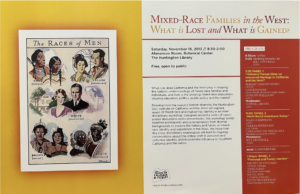
November 16, 2013
Ahmanson Room, Botanical Center, The Huntington
An inter-disciplinary workshop exploring issues of mixed-race and multi-ethnic identity in the American West. Drawing from the region’s historic diversity, the workshop will consider the role that California and the West plays in shaping the nation’s understandings of mixed-race families and individuals, and how the growing mixed-race population is shaping education, politics, public policy and the media.
This workshop, which is designed around a series of open-ended discussions and commentaries, will bring together participants and commentators from diverse backgrounds to explore the history and future of mixed-race identity and experience in the West and the nation. The workshop will be divided into three panels, each addressing particular themes including identity, demographics, politics, education, and media. We hope that this cross-disciplinary examination will lead to ongoing conversations about this critical shift in personal and collective identity, and their potential influence on Southern California and the nation.
-
Robert Chao Romero received his Ph.D. from UCLA in Latin American history and his Juris Doctor from U.C. Berkeley. His research explores the little-known history of Asian-Latinos, as well as the role of Christianity in social justice movements in Latin America and among U.S. Latinas/os. Romero is the author of several books, including, The Chinese in Mexico, 1882-1940 and Brown Church: Five Centuries of Latina/o Social Justice, Theology, and Identity. The Chinese in Mexico received the Latina/o Studies book award from the Latin American Studies Association and Brown Church received the InterVarsity Press Readers’ Choice Award for best academic title. Romero is also an attorney, ordained minister, and faith rooted community organizer.
-
Duncan Ryuken Williams was born in Tokyo, Japan to a Japanese mother and British father. After growing up in Japan and England until age 17, he moved to the U.S. to attend college (Reed College) and graduate school (Harvard University, where he received a Ph.D. in Religion). Williams is currently Professor of Religion and East Asian Languages & Cultures and the Director of the USC Shinso Ito Center for Japanese Religions and Culture. Previously, he held the Shinjo Ito Distinguished Chair of Japanese Buddhism at UC Berkeley and served as the Director of Berkeley’s Center for Japanese Studies for four years. He has also been ordained since 1993 as a Buddhist priest in the Soto Zen tradition and served as the Buddhist chaplain at Harvard University from 1994-96. He is the author The Other Side of Zen: A Social History of Soto Zen Buddhism in Tokugawa Japan (Princeton University Press, 2005) and American Sutra: A Story of Faith and Freedom in the Second World War (Harvard University Press, 2019). He is also the editor/co-editor of seven volumes including Hapa Japan (Kaya Press, 2017), Issei Buddhism in the Americas (U-Illinois Press, 2010), American Buddhism (Routledge/Curzon Press, 1998), and Buddhism and Ecology (Harvard University Press, 1997). He has translated four books from Japanese into English including Putting Buddhism to Work: A New Theory of Economics and Business Management (Kodansha, 1997). He has previously received research grants from the American Academy of Religion, Andrew W. Mellon Foundation, the Lilly Endowment, the Japan Foundation, the Japan Society for the Promotion of Science, the Numata Foundation/Society for the Promotion of Buddhism.
-
Marcia Alesan Dawkins is a tech-loving, diversity-oriented intellectual entrepreneur from New York City and a communication professor. An award-winning author, speaker, media commentator and educator, Marcia studies how diversity, technology and creative culture are changing who we are and how we communicate. Marcia has been sought out for her expertise by Google, BBC World, NPR, TIME Magazine, The New York Times, Fast Company, and The Leadership Alliance.
-
Fernando de Necochea recently retired as a senior member of Southern California Edison’s strategic engagement group, responsible for the utility company’s relationship to Latino leaders and Latino organizations in the region and state and nationwide and advisor on philanthropy to low-income and underserved communities. He remains active in the nonprofit sector, chairing the AltaMed Health Services board of directors and serving on the boards of CARECEN, the Mexican American Opportunity Foundation, and Parent Institute for Quality Education.
Prior to working in public affairs at Southern California Edison, he had a long career in higher education: as advisor to the president and assistant provost at Stanford University, director of financial aid and advisor to the vice provost at Brown, co-founder of the multi-component Chicano studies program at the University of California, Santa Barbara where he headed the research center and community service program, and lead organizer of El Plan de Santa Barbara conference. Fernando currently serves on the board of visitors of the Nelson A. Rockefeller Center for Public Policy and the Social Sciences at Dartmouth College, in addition to serving as chair of the UC Berkeley Statewide Puente advisory board, and on the corporate advisory board of the USC Latino Alumni Association.
-
Kurt Streeter wrote news features, covered transportation and crime, and was a columnist for the Sports section during his tenure at the Los Angeles Times. The most recent of his honors came from the California Newspaper Publishers Assn., which gave him its Best Feature Writing award in 2013 for a series chronicling life inside a hospice for hardcore prisoners. Two of his stories – a series about a girl boxer from East L.A. and her struggling father, and the tale of an elderly boxing timekeeper – appeared in the Best American Sports Writing anthology in 2006. An accomplished athlete, prior to his career in journalism he was world ranked by the Assn. of Tennis Professionals for three years.
-
Michelle Chihara’s academic book project analyzes the impact of the behavioral economic mode of thinking on contemporary American popular culture.
Publications include Studies in American Fiction, Postmodern Culture, and American Literary History.
At Whittier College she teaches creative writing, contemporary American literature, and media studies. She was a reporter for a number of years before going back to graduate school, and has published fiction, nonfiction, reportage and essays in a variety of publications, online and off.
-
Jessica Kim received her PhD in history at USC in 2012, was a postdoctoral fellow with ICW in 2013, and is currently Associate Professor of History at CSUN, where she teaches courses on Los Angeles, California, the borderlands, and public history. Her book, Imperial Metropolis: Los Angeles, Mexico, and the Borderlands of American Empire, 1865-1941 (UNC Press, 2019), explores the rise of Los Angeles and investment in Mexico. The book is the co-winner of the 2020 Kenneth Jackson Award for best book from the Urban History Association. She loves combining her interests in public history and the American West on ICW’s social media platforms.
-
Wonil Kim is a Associate Professor of Old Testament Studies at La Sierra University. He received his Ph.D. at Claremont Graduate University in 1996. He specializes in exegesis, theology, and hermeneutics of the Old Testament.
-
Keith Woodhouse received his Ph.D. from University of Wisconsin in 2010. Woodhouse teaches courses for the History Department and the Environmental Policy and Culture program. His research interests are environmental history, intellectual history, political history, and the twentieth-century United States. He is the author of The Ecocentrists: A History of Radical Environmentalism, which focuses on the ideas and political and philosophical commitments that radical environmentalists held and what those commitments tell us about the relationship between the environmental movement and American political thought. He has taught at several campuses in the University of Wisconsin system and held a postdoctoral fellowship at the University of Southern California in Los Angeles.
Can Settler Colonial Studies Contribute To A Reappraisal Of The Mormon Settlement Of A Great Basin Kingdom?
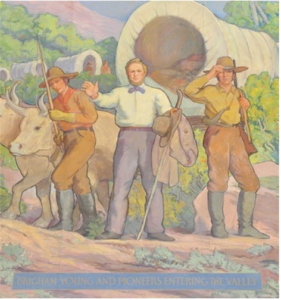
November 13, 2013
Munger Research Center, Seaver Classrooms, The Huntington
Lorenzo Veracini from Swinburne Institute for Social Research in Melbourne, Australia joins us to talk about settler colonialism and how its studies contribute to the reappraisal of the Mormon Settlement of a Great Basin Kingdom.
This programming is brought to you in partnership with USC’s American Studies and Ethnicity Department’s Indigenous and Decolonial Research Cluster.
-
Lorenzo Veracini is Associate Professor in history and politics at Swinburne’s Institute for Social Research. His research focuses on the comparative history of colonial systems and settler colonialism. Dr. Veracini has authored publications including Israel and Settler Society (2006), Settler Colonialism: A Theoretical Overview (2010), and The Settler Colonial Present (2015). He has also co-edited the Routledge Handbook of the History of Settler Colonialism (2016) and is Editor in Chief of Settler Colonial Studies.
Wyatt Earp: A Vigilante Life
ICW In Conversation with Andrew Isenberg
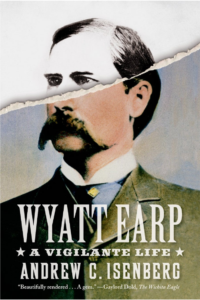
November 12, 2013
The Huntington
Andrew Isenberg joins ICW Director William Deverell to discuss his new book, Wyatt Earp: A Vigilante Life.
This conversation is part of a brown bag luncheon series sponsored by ICW.
-
Andrew Isenberg is Professor of History and Director of Graduate Studies at Temple University in Philadelphia. He is the author of The Destruction of the Bison: An Environmental History, 1750-1920 (Cambridge University Press, 2000); Mining California: An Ecological History (Hill and Wang, 2005), and, most recently, Wyatt Earp: A Vigilante Life (Hill and Wang 2013).
Junípero Serra: Context and Representation 1713 to 2013 Conference

September 20 and 21, 2013
Ahmanson Room, Botanical Center, The Huntington
Coinciding with The Huntington Library’s exhibition in recognition of the 300th anniversary of the birth of Junípero Serra, this conference will bring together an international group of scholars to explore the larger contexts within which Serra lived and the various ways he has been represented in California and beyond.
This programming is brought to you in partnership with Academy of American Franciscan History, The John Randolph Haynes and Dora Haynes Foundation, and USC-Huntington Early Modern Studies Institute.
___________________________________________________________________
Tales From Two Cities: Writing from California Conference (Part 1)
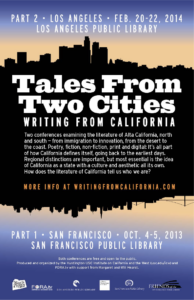
October 4-5, 2013
San Francisco Public Library
Two free conferences examining the literature of Alta, California, north and south — from immigration to innovation, from the desert to the coast. Poetry, fiction, non-fiction, print and digital: It’s all part of how California defines itself, going back to the earliest days. Regional distinctions are important, but most essential is the idea of California as a state with a culture and aesthetic all its own. What is our sensibility? How does the literature of California tell us who we are?
Read what Evan Karp of SFGate had to say about the conference.
___________________________________________________________________
CHINATOWN at the Natural History Museum
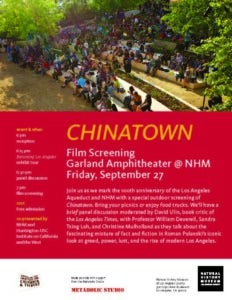
September 27, 2013
Natural History Museum
The 100th anniversary of the Los Angeles Aqueduct and the Natural History Museum is marked with a special outdoor screening of Chinatown, the classic 1974 neo-noir film about the rise of Los Angeles by way of the importation of water starring John Huston, Jack Nicholson, and Faye Dunaway.
This programming is brought to you by the Natural History Museum and the Huntington-USC Institute on California and the West, made possible with support from Metabolic Studio.
___________________________________________________________________
The World in the Curl: An Unconventional History of Surfing
ICW In Conversation with Peter Westwick and Peter Neushul
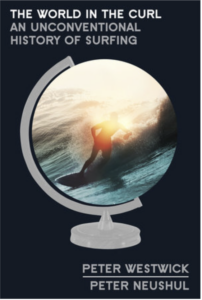
July 25, 2013
Munger Research Center, Seaver Classrooms, The Huntington
Authors of The World in the Curl, Peter Westwick and Peter Neushul join ICW Director William Deverell to offer a fresh angle on the remarkable rise of the sport and its influence on modern life, by highlighting the forces that fueled the sport’s expansion: colonialism, tourism, the military-industrial complex, globalization, capitalism, environmental engineering, and race and gender roles.
This conversation is part of a brown bag luncheon series sponsored by ICW.
-
Peter Westwick is a research professor in history at USC and director of ICW’s Aerospace History Project. He received his BA in physics and PhD in history from Berkeley. He is the author of Into the Black: JPL and the American Space Program, 1976-2004, which won book prizes from the American Institute of Aeronautics and Astronautics and the American Astronautical Society, and The National Labs: Science in an American System, 1947-1974, which won the book prize of the Forum for the History of Science in America. He is also editor of Blue Sky Metropolis: The Aerospace Century in Southern California, which was selected to Best Non-Fiction of 2012 by the LA Public Library, and co-author, with Peter Neushul, of The World in the Curl: An Unconventional History of Surfing, an LA Times bestseller. His most recent book is Stealth: The Secret Contest to Invent Invisible Aircraft. He is now working on a history of science and technology in California since the Gold Rush. In addition to overseeing archival acquisitions and oral histories for the Aerospace History Project, he contributes to ICW’s The West on Fire project.
-
Peter Neushul is the visiting Senior Associate Researcher in the Department of History at University of California, Santa Barbara. Neushul’s publications include books and articles on the history of science, the history of technology, environmental history, history of medicine, and military history. He holds bachelor’s, masters, and doctoral degrees from the University of California at Santa Barbara.
Catastrophe In California: A Reappraisal Of The St. Francis Dam Collapse
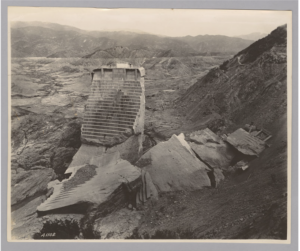
July 23, 2013
Los Angeles Public Library
In March of 1928, the St. Francis Dam north of Los Angeles—designed by William Mulholland as a reservoir for the California Aqueduct—collapsed. The largest engineering disaster in California history is inextricably woven into the epic history of water in Los Angeles. In this centennial year of the California Aqueduct, join us for a discussion of the St. Francis tragedy and its enduring catastrophic and cultural significance.
Click here to listen to the audio recording of the conversation.
This programming is brought to you in partnership with ALOUD of the Library Foundation of Los Angeles.
-
William Deverell is a professor of history at the University of Southern California, where he specializes in the history of California and the American West and directs a scholarly institute that collaborates with the Huntington Library in Pasadena. He is the author of Whitewashed Adobe: The Rise of Los Angeles and the Remaking of Its Mexican Past and Railroad Crossing: Californians and the Railroad, 1850-1910. With Greg Hise, he is co-author of Eden by Design: The 1930 Olmsted-Bartholomew Plan for the Los Angeles Region. William is a Fellow of the Los Angeles Institute for Humanities at USC.
-
Donald C. Jackson is the author of Building the Ultimate Dam: John S. Eastwood and the Control of Water in the American West and Pastoral and Monumental: Dams, Postcards, and the American Landscape (June 2013). In 2004 he co-authored with Norris Hundley Jr. the article “Privilege and Responsibility: William Mulholland and the St. Francis Dam Disaster” published in California History. Jackson is a Professor of History at Lafayette College in Easton, PA, and was recently in residence as a Trent R. Dames Fellow at The Huntington Library.
-
Rebecca Solnit is a writer, historian, activist, and author of thirteen books about ecology, environment, landscape, community, art, politics, hope, and memory. Her books include A Paradise Built in Hell: The Extraordinary Communities that Arise in Disaster; A Field Guide to Getting Lost; Hope in the Dark: Untold Histories; Wanderlust: A History of Walking, and most recently, the bestselling volume of 19 essays and 22 innovative maps, titled Infinite City: A San Francisco Atlas. Solnit has received many awards for her writing, including a Guggenheim Fellowship, the National Book Critics Circle Award in criticism, and the Lannan Literary Award for her book River of Shadows: Eadweard Muybridge and the Technological Wild West.
-
Patt Morrison is a writer and columnist for the Los Angeles Times and she hosted the daily Patt Morrison public affairs program on KPCC. She has won six Emmys and ten Golden Mike awards for Life & Times Tonight on KCET, and for her KPCC show, which won three Golden Mike Awards for Best Public Affairs Show in its six-year run. She’s the author of the best-selling Rio LA, Tales from the Los Angeles River, and her interview subjects include Salman Rushdie, Henry Kissinger, Jimmy Carter, Al Gore and Ray Bradbury.
Laboratory For Modernity
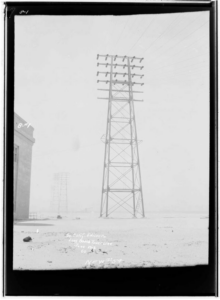
July 11, 2013
Pasadena Central Library
Scholars and urban planners participate in a discussion focused on landscape and infrastructural changes in greater Los Angeles, ca. 1940-1990. The evening’s panel event draws on a new online photographic exhibit drawn from the Southern California Edison photographic archive at the Huntington Library. That archive, with more than 70,000 images, offers a fascinating tour of the Los Angeles past and insight into how Los Angeles became modern.
-
Greg Hise studies metropolitan economies and the politics of land use in order to better understand the social life of cities. After completing a doctorate in architectural history at UC Berkeley Hise joined the faculty at USC where he offered undergraduate surveys exploring histories of policy, planning, and Los Angeles and graduate seminars on qualitative methods, spatial theory, and urban environmental history. Since joining the History Department at UNLV in 2008 he has taught courses and colloquia examining urbanization in the Pacific World, the geography of Civil Rights, digital humanities, and philosophy of history.
Professor Hise is the author, co-author, or co-editor of five books. Magnetic Los Angeles: Planning the Twentieth-Century Metropolis (1997) received the Spiro Kostof Book Prize (Society of Architectural Historians) and the Pflueger Award (Historical Society of Southern California). He co-authored Eden by Design: The 1930 Olmsted-Bartholomew Plan for the Los Angeles Region (2000) with William Deverell with whom he co-edited Land of Sunshine: An Environmental History of Los Angeles (2005), and A Companion to Los Angeles (2010). In addition Hise has published more than twenty-five articles or book chapters examining residential and industrial development, municipal enterprise, regions and regionalism, architecture as state building, representations of cities in a digital age, and the pedagogical challenges of humanities education in professional schools. His current project, “Property Rights and Civil Rights,” is a history of residential segregation and the struggle to secure open housing in twentieth-century America. That story, told through the career of activist attorney Loren Miller, brings California to the forefront of a narrative that has been southern and northern in its geography.
-
William Deverell is a professor of history at the University of Southern California, where he specializes in the history of California and the American West and directs a scholarly institute that collaborates with the Huntington Library in Pasadena. He is the author of Whitewashed Adobe: The Rise of Los Angeles and the Remaking of Its Mexican Past and Railroad Crossing: Californians and the Railroad, 1850-1910. With Greg Hise, he is co-author of Eden by Design: The 1930 Olmsted-Bartholomew Plan for the Los Angeles Region. William is a Fellow of the Los Angeles Institute for Humanities at USC.
-
Sarah Schrank is Professor of History at California State University, Long Beach where she teaches courses in United States urban history, women’s history, body studies, and public art. She received her Bachelor of Arts degree from McGill University and her Master’s and PhD from the University of California, San Diego. She serves on the editorial board of Public Art Dialogue and is currently completing a book about nudism and natural living in modern urban environments.
-
Jan Reiff received her Ph.D. from the University of Washington in 1981. She worked at the Newberry Library, Northwestern University, Case Western Reserve University, and the University of Bremen before joining the UCLA faculty in 1992.Prof. Reiff has published Structuring the Past: The Use of Computers in History (1992), edited, with Helen Hornbeck Tanner, Dirk Hoerder, Henry Dobyns, and John Long, The Settling of North America: The Atlas of the Great Migrations into North America from the Ice Age to the Present (1995), with James R. Grossman and Ann Durkin Keating, the prize-winning The Encyclopedia of Chicago (2004), and, most recently, Chicago Business and Industry: FROM FUR TRADE TO E-COMMERCE (2013). The online version of the Encyclopedia of Chicago was launched in 2005 as joint project of the Chicago Historical Society, the Newberry Library, and Northwestern University. She has also published numerous articles on a variety of different topics. Currently, Prof. Reiff is finishing a manuscript tentatively entitled “Manufacturing Communities: Pullman Workers and Their Towns, 1880-1981.”
-
Eric Avila is an urban cultural historian, studying the intersections of racial identity, urban space, and cultural representation in twentieth century America.
He began his undergraduate education at UC Berkeley in 1986 and left that institution with a Ph.D. in History in 1997, writing his dissertation under the supervision of Professor Lawrence Levine. Since 1997, he has taught Chicano Studies and History at UCLA. and holds an affiliation with the Department of Urban Planning. He is the author of Popular Culture in the Age of White Flight: Fear and Fantasy in Suburban Los Angeles, published by the University of California Press in 2004. His latest book, The Folklore of the Freeway: Race and Revolt in the Modernist City, was published by the University of Minnesota Press in 2014.
-
Alan Loomis is an urban designer, planner and educator practicing in the Los Angeles area. Presently he is Principal of Urban Design at PlaceWorks, based in the firm’s Los Angeles office. He is responsible for growing PlaceWorks’ urban design practice in the Los Angeles region and plays a key role in high-profile design projects throughout California.
From 2017 to 2020 Alan was the City Urban Designer for Santa Monica, California. In this role, he was the City’s lead for Promenade 3.0, a comprehensive redesign proposal of the iconic Third Street Promenade.
Before Santa Monica, Alan led the urban design program for the City of Glendale for twelve years, starting in 2005 as the City’s first on-staff urban designer. In Glendale, he personally managed the design review of over 30 significant projects, working with some of the most prominent architects in the region during regular crit sessions. Additionally, he directed a wide range of urban design-based policy projects, such as the Glendale Downtown Specific Plan, Tropico Station District Plan, Maryland Off Broadway Art & Entertainment District, the Small Lot Subdivision Ordinance, and the Space 134 Freeway Cap Park, leading multi-disciplinary teams through an equally wide range of public outreach programs.
The Great Ocean: Pacific Worlds From Captain Cook To The Gold Rush
ICW In Conversation with David Igler
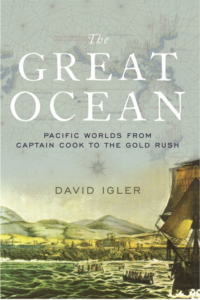
April 24, 2013
Botanical Auditorium, The Huntington
Author David Igler talks about his new book The Great Ocean: Pacific Worlds From Captain Cook To The Gold Rush. The Pacific of the early eighteenth century was not a single ocean but a vast and varied waterscape, a place of baffling complexity, with 25,000 islands and seemingly endless continental shorelines. But with the voyages of Captain James Cook, global attention turned to the Pacific, and European and American dreams of scientific exploration, trade, and empire grew dramatically. By the time of the California gold rush, the Pacific’s many shores were fully integrated into world markets-and world consciousness. The Great Ocean draws on hundreds of documented voyages–some painstakingly recorded by participants, some only known by archeological remains or indigenous memory–as a window into the commercial, cultural, and ecological upheavals following Cook’s exploits.
-
David Igler began his academic career as a U.S. historian specializing in the American West and environmental history. After publishing his first book (Industrial Cowboys: Miller & Lux and the Transformation of the Far West, 1850-1920) he decided to explore the waterscape and regions west of the West: the Pacific Ocean. This research has consumed him for the past decade. He is especially interested in the time period between the 1770s and the 1850s, and the geographic connections between the island Pacific, East Asia, the northern Pacific, and the western Americas. It entails a vast oceanic and peopled space, as described in his recent book The Great Ocean: Pacific Worlds from Captain Cook to the Gold Rush (Oxford University Press, 2013). The book draws on hundreds of documented voyages—some painstakingly recorded by participants, some only known by archeological remains or indigenous memory—as a window into the commercial, cultural, and ecological upheavals following the initial contact period. He reamins fascinated by the environmental and cultural history of the Pacific, as well as the rapidly developing fields encompassed by Pacific Studies.
Paving The Past: The Los Angeles River As Flood Control Device
Trent Dames Lecture in the History of Civil Engineering
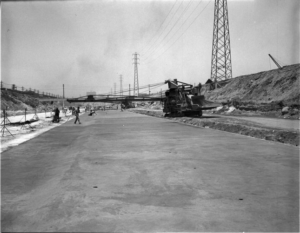
April 22, 2013
Friends’ Hall, The Huntington
William Deverell, the Chair of USC’s History Department and the Director of the Huntington-USC Institute on California and the West, will give this year’s annual Trent Dames Lecture in the History of Civil Engineering. As Los Angeles grew to metropolitan maturity with the arrival of the 20th century, one landscape feature became increasingly tagged as a problem, even a menace. As Los Angeles grew to metropolitan maturity with the arrival of the 20th century, one landscape feature became increasingly tagged as a problem, even a menace.
The tiny and generally unreliable Los Angeles River proved, as winter rains caused it to leap its banks and fill much of the basin with floodwater, to be a tempestuous and even dangerous obstacle to regional growth. Enter, by way of innovations in engineering and hydrology, the long-range plan to pave the river into submission. This lecture explores that history and, along the way, investigates the ways in which large-scale environmental projects such as cementing a river can inevitably reveal much about regional culture and identity.
-
William F. Deverell received his undergraduate degree from Stanford University in American Studies with honors and distinction. He received his Ph.D. in American History from Princeton University. He is Professor of History at the University of Southern California and Director of the Huntington-USC Institute on California and the West, which was founded in 2004. He also directs the USC Libraries Collections Convergence Initiative. He previously taught at the California Institute of Technology and the University of California, San Diego.
Professor Deverell teaches and writes about the nineteenth and twentieth century American West. He is the author, editor, or co-editor of numerous books exploring a variety of topics and themes. They include The Blackwell Companion to Los Angeles (co-edited with Greg Hise); The Blackwell Companion to California History (co-edited with David Igler); and The Blackwell Companion to the History of the American West. He is the author of Whitewashed Adobe: The Rise of Los Angeles and the Remaking of Its Mexican Past and of Railroad Crossing: Californians and the Railroad, 1850-1910, as well as the recently-published Kathy Fiscus: A Tragedy that Transfixed the Nation. With the historian Tom Sitton, he is the co-editor of Metropolis in the Making: Los Angeles in the 1920s and California Progressivism Revisited. With Greg Hise, he co-authored Eden by Design: The 1930 Olmsted-Bartholomew Plan for the Los Angeles Region and co-edited Land of Sunshine: An Environmental History of Metropolitan Los Angeles. He and Professor Anne Hyde of the University of Oklahoma co-authored the two volume Shaped by the West: A History of North America.
Inexplicable Los Angeles: Ghosts And Traces, 1940-1990
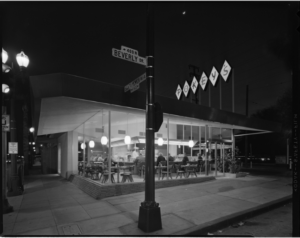
April 15, 2013
USC Doheny Memorial Library 240
This panel discussion with distinguished thinkers and writers about Los Angeles ponders the astonishing Southern California Edison archive of 70,000 images devoted to the expansion of electrification in the Los Angeles basin. This event showcases the online exhibition about landscape and form in Los Angeles, which is part of The Getty’s initiative Pacific Standard Time Presents, an exploration of the rise of modern architecture in Los Angeles, 1940-1990.
This programming is brought to you by the Pacific Standard Times Presents: Modern Architecture in L.A.
-
D. J. Waldie is author, essayist, and commentator. He is a life-long resident of Lakewood and its former Deputy City Manager. He also is a commentator for KCET and a contributing editor of the Los Angeles Times.
-
Leo Braudy is among America’s leading cultural historians and film critics. Currently University Professor and Leo S. Bing Chair in English and American Literature at the University of Southern California, he teaches Restoration literature and history, American culture after World War Two, popular culture and critical theory, including the histories of visual style and film genres. His work appears in journals such as American Film, Film Quarterly, Genre, Novel, Partisan Review, and Prose Studies—to name a few.
His book Jean Renoir: The World of His Films was a finalist for the National Book Award. The Frenzy of Renown: Fame and Its History was a finalist for the National Book Critics Circle Award. He has written for the New York Times, the Washington Post, and Harper’s. His book From Chivalry to Terrorism, was named Best of the Best by the Los Angeles Times and a Notable Book of the Year by the New York Times.
-
William F. Deverell received his undergraduate degree from Stanford University in American Studies with honors and distinction. He received his Ph.D. in American History from Princeton University. He is Professor of History at the University of Southern California and Director of the Huntington-USC Institute on California and the West, which was founded in 2004. He also directs the USC Libraries Collections Convergence Initiative. He previously taught at the California Institute of Technology and the University of California, San Diego.
Professor Deverell teaches and writes about the nineteenth and twentieth century American West. He is the author, editor, or co-editor of numerous books exploring a variety of topics and themes. They include The Blackwell Companion to Los Angeles (co-edited with Greg Hise); The Blackwell Companion to California History (co-edited with David Igler); and The Blackwell Companion to the History of the American West. He is the author of Whitewashed Adobe: The Rise of Los Angeles and the Remaking of Its Mexican Past and of Railroad Crossing: Californians and the Railroad, 1850-1910, as well as the recently-published Kathy Fiscus: A Tragedy that Transfixed the Nation. With the historian Tom Sitton, he is the co-editor of Metropolis in the Making: Los Angeles in the 1920s and California Progressivism Revisited. With Greg Hise, he co-authored Eden by Design: The 1930 Olmsted-Bartholomew Plan for the Los Angeles Region and co-edited Land of Sunshine: An Environmental History of Metropolitan Los Angeles. He and Professor Anne Hyde of the University of Oklahoma co-authored the two volume Shaped by the West: A History of North America.
-
Phil Ethington is a historian, completing a global, environmental, and human history of Los Angeles since the Pleistocene Epoch (2.5 million years ago). He teaches courses on North American history, mostly in the 20th century. He has two daughters, ages 19 and 23, who sometimes live with him. His dog Harvey, seen often around new North, is a dachshund-poodle mix. In his spare time, Prof. Ethington is starting a native plant farm on the Carrizo Plain, the last native grassland in California. He is also an inventor, with strange and clever contraptions on view in his New North apartment.
-
Claudia Bohn Spector is an independent curator with a doctorate in Art History and American Studies from the Ludwig Maximillian University of Munich, Germany.
-
Josh Oreck is a filmmaker and is known as an Director, Producer, Executive Producer, and Cinematography. Some of their work includes The Matrix series, John Wick series, and much more.
“Better Living Through Electricity:” Los Angeles, 1940-1990

April 1, 2013
USC Doheny Memorial Library 240
Join us for an evening’s discussion and presentation of images about architecture, culture, and electricity in modern Los Angeles. As part of the Getty-initiated Pacific Standard Time Presents: Modern Architecture in L.A., The Huntington Library has partnered with the Huntington-USC Institute on California and the West to mount an innovative on-line photography exhibit which explores landscape change in Los Angeles solely by reference to the Southern California Edison archive at The Huntington. Comprised of 70,000 images spanning the late 19th century into the 1970s, the archive offers a remarkable view of what the greater Los Angeles region was and, through electricity, could and did become.
This programming is brought to you by the Pacific Standard Times Presents: Modern Architecture in L.A.
-
Greg Hise studies metropolitan economies and the politics of land use in order to better understand the social life of cities. After completing a doctorate in architectural history at UC Berkeley Hise joined the faculty at USC where he offered undergraduate surveys exploring histories of policy, planning, and Los Angeles and graduate seminars on qualitative methods, spatial theory, and urban environmental history. Since joining the History Department at UNLV in 2008 he has taught courses and colloquia examining urbanization in the Pacific World, the geography of Civil Rights, digital humanities, and philosophy of history.
-
William F. Deverell received his undergraduate degree from Stanford University in American Studies with honors and distinction. He received his Ph.D. in American History from Princeton University. He is Professor of History at the University of Southern California and Director of the Huntington-USC Institute on California and the West, which was founded in 2004. He also directs the USC Libraries Collections Convergence Initiative. He previously taught at the California Institute of Technology and the University of California, San Diego.
Professor Deverell teaches and writes about the nineteenth and twentieth century American West. He is the author, editor, or co-editor of numerous books exploring a variety of topics and themes. They include The Blackwell Companion to Los Angeles (co-edited with Greg Hise); The Blackwell Companion to California History (co-edited with David Igler); and The Blackwell Companion to the History of the American West. He is the author of Whitewashed Adobe: The Rise of Los Angeles and the Remaking of Its Mexican Past and of Railroad Crossing: Californians and the Railroad, 1850-1910, as well as the recently-published Kathy Fiscus: A Tragedy that Transfixed the Nation. With the historian Tom Sitton, he is the co-editor of Metropolis in the Making: Los Angeles in the 1920s and California Progressivism Revisited. With Greg Hise, he co-authored Eden by Design: The 1930 Olmsted-Bartholomew Plan for the Los Angeles Region and co-edited Land of Sunshine: An Environmental History of Metropolitan Los Angeles. He and Professor Anne Hyde of the University of Oklahoma co-authored the two volume Shaped by the West: A History of North America.
-
Jessica Kim received her PhD in history at USC in 2012, was a postdoctoral fellow with ICW in 2013, and is currently Associate Professor of History at CSUN, where she teaches courses on Los Angeles, California, the borderlands, and public history. Her book, Imperial Metropolis: Los Angeles, Mexico, and the Borderlands of American Empire, 1865-1941 (UNC Press, 2019), explores the rise of Los Angeles and investment in Mexico. The book is the co-winner of the 2020 Kenneth Jackson Award for best book from the Urban History Association. She loves combining her interests in public history and the American West on ICW’s social media platforms.
-
Peter Westwick is a research professor in history at USC and director of ICW’s Aerospace History Project. He received his BA in physics and PhD in history from Berkeley. He is the author of Into the Black: JPL and the American Space Program, 1976-2004, which won book prizes from the American Institute of Aeronautics and Astronautics and the American Astronautical Society, and The National Labs: Science in an American System, 1947-1974, which won the book prize of the Forum for the History of Science in America. He is also editor of Blue Sky Metropolis: The Aerospace Century in Southern California, which was selected to Best Non-Fiction of 2012 by the LA Public Library, and co-author, with Peter Neushul, of The World in the Curl: An Unconventional History of Surfing, an LA Times bestseller. His most recent book is Stealth: The Secret Contest to Invent Invisible Aircraft. He is now working on a history of science and technology in California since the Gold Rush. In addition to overseeing archival acquisitions and oral histories for the Aerospace History Project, he contributes to ICW’s The West on Fire project.
-
Kris Mun is the designer and exhibitor for AAC’s Digital Futures exhibition in Shanghai August 2011, showed her work amongst other prominent practices, including Zaha Hadid Architects, Greg Lynn, UNStudio, that are engaging in computational and digital fabrication strategies in architecture.
-
Robbert Flick is a Southern California artist who uses photography as his primary medium. Flick, a native of Holland, received a B.A. at the University of British Columbia and an M.A. and M.F.A. at the University of California, Los Angeles. His work is in the permanent collections of numerous institutions both nationally and internationally, including Armand Hammer Museum, Los Angeles; Bibliotheque National, Paris; Chicago Art Institute; High Museum of Art, Atlanta; Los Angeles County Museum of Art; Museum of Contemporary Art, Los Angeles; San Francisco Museum of Modern Art; National Museum of American Art, Smithsonian, Washington DC.Most recently, Robbert Flick’s work has been featured in Under The Big Black Sun: California Art 1974-1981, at MOCA. The retrospective Robbert Flick: Trajectories was shown at the Los Angeles County Museum of Art accompanied by a major LACMA/Steidl catalog. Flick is the recipient of numerous awards including a Guggenheim Fellowship, two National Endowment for the Arts Individual Artist Fellowships, a Ford Foundation Faculty Enrichment Grant and a Flintridge Foundation Award and a County of Los Angeles COLA Award. Flick has been a scholar at the Getty Research Institute and is Professor of Photography at the University of Southern California Roski School of Art and Design, where he has taught since 1976.
-
Christopher Hawthorne is the Chief Design Officer for the city of Los Angeles, a position appointed by Mayor Eric Garcetti. Prior to joining City Hall, Hawthorne was architecture critic for the Los Angeles Times from 2004 to early 2018. He is Professor of the Practice at Occidental College, where since 2015 he has directed the Third Los Angeles Project, a series of public conversations about architecture, urban planning, mobility, and demographic change in Southern California. He has also taught at U.C. Berkeley’s Graduate School of Journalism, Columbia University, and the Southern California Institute of Architecture. A frequent collaborator with KCET-TV, the PBS affiliate in Los Angeles, Hawthorne wrote and directed the hour-long documentary “That Far Corner: Frank Lloyd Wright in Los Angeles,” which had its broadcast debut earlier this year, and received an L.A.-area Emmy Award as Executive Producer for the 2016 KCET program “Third L.A. with Architecture Critic Christopher Hawthorne.” He has been a Mid-Career Fellow at Columbia University’s National Arts Journalism Program and a Resident in Criticism at the American Academy in Rome. Hawthorne grew up in Berkeley and holds a bachelor’s from Yale College, where he studied political science and architectural history.
What We Talk About When We Talk About Energy: History, Culture, and Energy in the Twentieth-Century United States
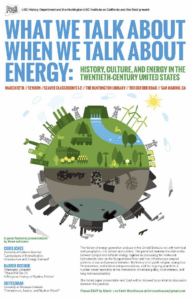
March 12, 2013
Munger Research Center, Seaver Classrooms, The Huntington
The history of energy generation and use in the United States is not only technical and geographic; it is cultural and political. This panel will examine the relationship between people and different energy regimes by discussing the Holtwood hydroelectric dam on the Susquehanna River and how infrastructure shaped patterns of use and personal behavior; the history of oil patch religion, evangelical Protestantism, and wildcat entrepreneurialism; and the ongoing search for a nuclear waste repository at the intersection of national policy, local interests, and long-term sustainability.
This programming is brought to you in partnership with the USC History Department.
-
“Landscapes of Intensification: Infrastructure and Energy Demand”
Chris Jones is Director of the CoolClimate Network, a university-government-industry partnership at the University of California, Berkeley. He also serves as faculty lecturer in the Haas School of Business, and Program Chair (12th year) of the Behavior, Energy and Climate Change Conference.
Jones is a leading expert in carbon footprint analysis, the design of behavior-based programs and regional climate policy. In 2005, he published the first comprehensive carbon footprint calculator, which accounts for the greenhouse gas emissions of all transportation, energy, food, goods and services purchased by U.S. households. Versions of CoolClimate software have since been adopted by governments, businesses and non-governmental organizations throughout the United States and internationally. The research underlying these tools (Google Scholar Profile) helps inform community and state-level climate policy. CoolClimate also develops and evaluates programs to engage, educate, motivate and empower individuals to take climate action. Examples include the Cool Campus Challenge and the CoolCalifornia Challenge. Through research, tools, education, outreach, and networking CoolClimate seeks to help shift talent and resources to the most promising climate solutions.
-
“There Will Be Oil: A Religious History of Pipeline Politics”
Darren Dochuk is Associate Professor in the Department of History at the University of Notre Dame. He is the author of From Bible Belt to Sunbelt: Plain-folk Religion, Grassroots Politics, and the Rise of Evangelical Conservatism, published by Norton in 2011, which won the Society of American Historians’ Allan Nevins Prize, American Historical Association’s John H. Dunning book prize for outstanding historical writing on any subject in U.S. history, and Organization of American Historians’ Ellis W. Hawley prize for best book in post-Civil War U.S. political history. Dochuk has also co-edited a number of essay collections, including Sunbelt Rising: The Politics of Space, Place, and Region (University of Pennsylvania Press, 2011), American Evangelicalism: George Marsden and the State of American Religious History University of Notre Dame Press, 2014), and Faith in the New Millennium: The Future of Religion and American Politics (forthcoming with Oxford University Press, 2016). He has published essays in several edited collections and journals, including International Labor and Working-Class History, Religion and American Culture, and the Journal of American History, and received research support from a number of organizations, most recently the American Council of Learned Societies, National Endowment for the Humanities, American Philosophical Society, Rockefeller Foundation, and Canadian government. In 2007-2008, he served as a research postdoctoral fellow at the Center for the Study of Religion at Princeton University. During the spring of 2013 he was the inaugural Bill & Rita Clement Senior Research Fellow at the Clements Center for Southwest Studies at Southern Methodist University. Dochuk is currently writing a book titled Anointed With Oil: God and Black Gold in America’s Century (under contract with Basic Books).
-
“Permanence, Justice, and Nuclear Waste”
Dr. Jim Feldman is an environmental historian whose teaching and research interests include American and global environmental history, wilderness and National Park Service policy, radioactive waste policy and management, and campus sustainability. He has explored these subjects in two books: A Storied Wilderness: Rewilding the Apostle Islands and Nuclear Reactions: Documenting American Encounters with Nuclear Energy. He is currently an active member of the FORWAR+DS in Place project, in which he is exploring the history of the PCB cleanup in the Fox River. Dr. Feldman was a founding member of the UW Oshkosh Sustainability Initiative and a co-author of its first Campus Sustainability Plan. He chaired the Campus Sustainability Council for six years and currently coordinates the Signature Question for Sustainability in the University Studies Program. Dr. Feldman is a member of the strategic planning comm
The Battle For The American Mind: The Culture Wars In Higher Education
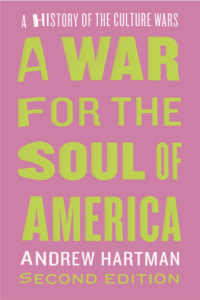
February 25, 2013
USC Doheny Memorial Library
Whether the culture wars in higher education during the 1980s and 1990s had political consequences is debatable. But that they had enduring historical significance is inarguable. Shouting matches about academia reverberated beyond the ivory tower to lay bare a crisis of national faith, demonstrating that the culture wars did not boil down to any one specific issue or even a set of issues. Rather, the culture wars often hinged on a more epistemological question about national identity: How should Americans think? Andrew Hartman, Professor at Illinois State University, talks about the battle for the American mind.
This programming is brought to you in partnership with the USC History Department.
-
Andrew Hartman is a professor of history at Illinois State University focusing on U.S. intellectual history. He is the author of Education and the Cold War: The Battle for the American School (2008) and A War for the Soul of America: A History of the Culture Wars (2015). He is currently at work on his third book, “Karl Marx in America,” which is contracted to be published by the University of Chicago Press. Hartman is the winner of two Fulbright Awards. He was the Fulbright Distinguished Chair in American Studies at the University of Southern Denmark for the 2013-14 academic year, and he was the Fulbright British Library Eccles Center Research Scholar for 2018-19. Hartman was the founding president of the Society for U.S. Intellectual History. He has been published in a host of academic and popular venues, including the Washington Post, Baffler, Chronicle of Higher Education, American Historian, Journal of American Studies, Reviews in American History, Journal of Policy History, Salon, Jacobin, Bookforum, and In These Times.